What is marketing and sales automation?
Marketing and sales automation is the process of using a variety of different AI (artificial intelligence) tools and technologies to automate campaigns and activities to help streamline their business processes with minimal human input.
With marketing and sales automation, marketing and sales teams can send the right messages at the right time to the right people, allowing them to save time and be more efficient with their efforts. By completing repetitive tasks with email marketing, social media posting, and ad campaigns, teams have been able to save on average 6 hours a week. And by using automation to help with lead generation and lead nurturing efforts, businesses have seen an increase of 14.5% in sales productivity and have seen an increase in the number of leads generated too.
Let’s take a look at the various ways automation can help businesses streamline and scale their digital marketing and sales efforts.
Benefits of Marketing and Sales Automation
1. Improve the customer experience
Using AI tools, you can gather data based on each contact’s interactions with your business, such as contact information, topics of interest, email engagements, social media engagement, web page visits, etc. Use this data to send automated messages that are targeted and relevant based on the information you’ve gathered to create a personalized experience for each contact. Not only will this allow you to nurture leads down the sales funnel by sending targeted relevant and timely messages, but it can also improve the overall quality of leads you receive.
Businesses can also use the data captured from AI tools to suggest additional content of interest, and therefore create a truly engaging and personalized experience. For example, Amazon uses AI to offer items each customer may be interested in based on their previous purchases.
2. Save time and increase efficiency by automating time-consuming tasks
74% of marketers claim that the biggest benefit of automation is saving time. Save time and make your entire department more efficient by automating repetitive tasks such as finding leads, following up with leads, collecting and inputting data, and scheduling meetings, to name a few.
Time normally spent on these kinds of time-consuming tasks can be reallocated to higher ROI efforts such as creating and expanding the marketing and sales funnel.
3. Align marketing and sales teams
Misalignment between marketing and sales can cost companies an average of 10% of their annual revenue per year, and can result in loss of productivity and wasted budget. There are a few automation techniques to help keep teams aligned and working efficiently.
Start by automating and storing contact data information in a CRM (customer relationship management system), that way both teams have access to accurate real-life customer and lead information, such as demographic information, email and social engagements, website views, form submissions, etc. in one place. Both teams can gather and use this information to get a better understanding of their contacts’ needs and interests and personalize their messages to move them to the next stage in the buyer’s journey.
Lead scoring is an automation tactic that gathers historical consumer behavior to score how likely a lead is to convert and helps identify where a contact is within the sales funnel. With both teams having an understanding of each stage within the sales funnel and the roles responsible for each stage, it makes for an easy transition from one team to the other.
4. Sales forecasting
With AI and automation tools you can gather real-time data to start identifying patterns of behavior to help accurately forecast sales. Using lead scoring methods you can start to rank a lead’s sales-readiness by assigning points to different contact interactions with your business.
Based on a contact’s lead score, marketing and sales can quickly and easily identify what stage their contacts are within the buyer’s journey and determine next steps for how to follow-up and can even predict how long it will take for each prospect to move through the funnel.
5. Ability to generate more and better-qualified leads
Using a variety of automation channels to gather data you can qualify your leads before they ever reach the sales representatives. With tools such as AI chat and smart forms you’re not only able to gather more information by asking demographic questions or questions about their interests to qualify your leads, but because these channels are available at all times you’re also giving your contacts more channels to engage with your business and convert, even after business hours.
6. Increase in conversion rate and ROI
Companies that use marketing automation have seen conversion rates as high as 50%. Because businesses are automating a large portion of their time-consuming tasks with automation tools, they can now focus on attribution marketing and look at past data to measure the ROI of their efforts, and make adjustments for improvements. And by using reporting and analytics automation to get an accurate real-time visibility on data metrics, you can have a better understanding of what content and messaging each of your contacts prefer and what channels, campaigns etc. are converting them into customers so you can continue to allocate your resources accordingly.
7. Marketing and sales enablement
For marketers, the biggest challenge is to create personalized content that nurtures leads down the funnel until they become ready to speak to a sales representative. There are a lot of automation tools that gather information and create content based on what users have previously shown interest in. Additionally, automation software can help businesses find best practices when it comes to the language used towards a particular audience, identify keywords your audience would be interested in, and determine best times to schedule emails, therefore saving time and effort throughout the process.
Sales team members can use automation and AI tools like chatbots, appointment scheduling software, online transactions tools, e-signature tools, and interactive videos to streamline the sales process. Not only can these tools generate and qualify leads when the contacts are actively engaged, but can also make it easier to close deals, shorten the sales cycle, and generate revenue.
Types of Marketing Automation
1. Lead scoring
As previously mentioned, lead scoring identifies leads that are ready to convert. These can sometimes be referred to as “hot leads”. Automation tools can determine when the visitors downloaded a resource, visited your website multiple times, or signed up for a demo, and score them based on how likely they are to convert. When a lead is given a high enough score to be deemed “sales-ready” then a notification can be sent to the sales team for further processing.
2. Email marketing automation
Sending personalized emails out to every contact throughout the buyer’s journey is incredibly unrealistic and time-consuming. Email marketing automation allows businesses to send personalized emails to contacts and customers with different campaigns and messaging based on previous interests and information gathered. They can either be triggered by a certain contact’s action, or scheduled in advance to select audiences. This saves time and makes it easier to have ongoing (and relevant) communication with each contact at all times, creating a great human experience for users as they move through the sales funnel.
3. Social media automation
The tiring switch between different social media platforms is solved through the use of social media automation. With calendars and scheduling tools, marketers can plan and schedule various posts in advance and attach them to campaigns.
Social media automation cuts down on the time spent going into each platform to post, and makes it easier to schedule and post at optimal times for audience engagement and growth.
4. Analytics and reporting
While keeping up to date on metrics and KPIs is incredibly important, it can also be incredibly time-consuming. CRM reporting, Google Analytics, and other reporting and analytics software can pull ongoing automated reports so you’re always getting real-life data visibility. You can craft reports specific to the items you are targeting such as the amount of views of a specific resource or the amount of sales influenced by a landing page to measure the ROI/conversion rates of your tactics and campaigns. The use of dashboards in reporting also gives a visualization of the completion of goals or targets set by both the marketing and sales teams.
5. A/B Testing
A/B testing consists of a randomized experiment with two different variables that tests which variant performs better. These tests are used to make informed decisions about what your audience prefers, whether it be the content, design or user experience for your emails, landing pages, webpages etc. Using automation to gather the data and analyze which test outperformed the other will save you time and ensure a more accurate result.
6. Webform Automation
An AI tool called Smart Forms allows you to dynamically change the information requested on your contact forms depending on information they’ve already provided on the form, or based on other demographic information we already know about that user. So if a user has already filled out one of your forms, their email will automatically fill in their email address previously provided, and instead request they fill out a different form field, such as state or company, to gather even more qualifying information. Or, if a dynamic contact form were to ask if you have any children, for example, and you selected ‘no’ then the form would skip the next questions asking the number of children you have.
7. Support
Chatbots are a conversational AI tool used primarily in the bottom right corner of a webpage to assist users while visiting your site. During business hours, users can be connected with a support agent to help answer questions or provide additional resources, and after hours chatbots can take over and provide a similar (script automated) experience without an employee present.
Automation Tools
1. CRM automation
HubSpot and Salesforce create the perfect platform to contact and sort sales qualified leads. Typically there are features and integrations where you can add social media scheduling, workflow automation, email marketing automation etc., to make it your CRM a fully robust automation tool. Salesforce can also integrate with HubSpot to create better alignment with marketing sales teams by providing real-time visibility into the pipeline and easy access to lead data. And HubSpot also provides a resource to better understand its automation and tips for using its features.
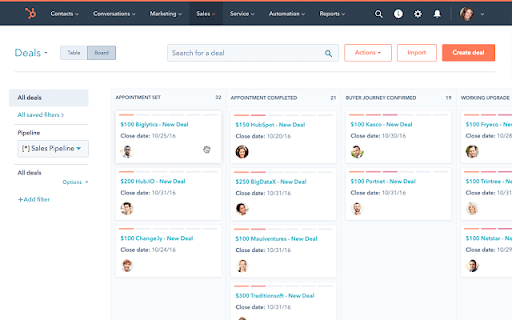
2. AI chatbots
Easily incorporate automated conversation tools like HubSpot Chat or Drift onto your website right now. Chatbots make it easy to engage with website visitors during all hours of the day and nonbusiness hours to avoid the loss of potential customers. Chatbots continue to save 20-40% of the website viewers who would visit during non-business hours. Plus, you can easily ask qualified questions or convert leads using automated scripting features.
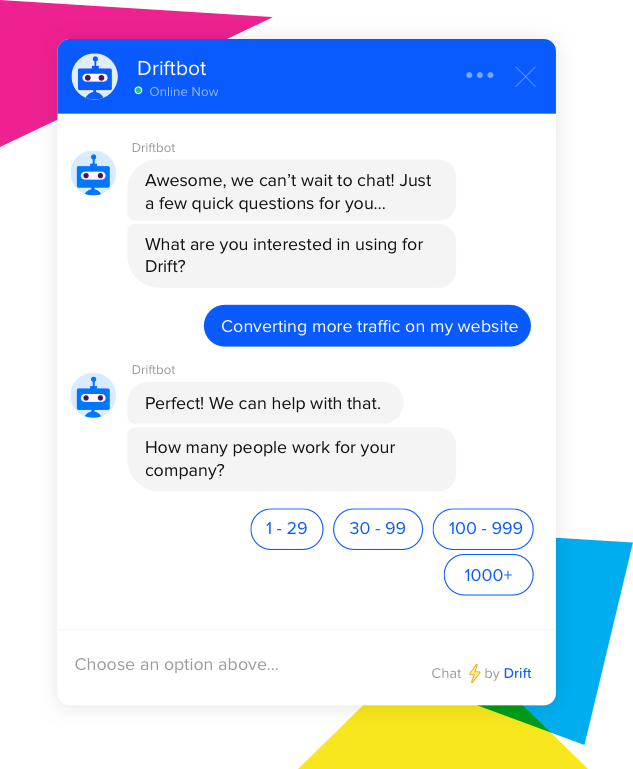
3. Social media scheduling
Hootsuite is the platform to easily manage your social media and get the results you are aiming for. The platform gives you the ability to manage ads, publish social posts, and build a content library for resources. You can also create a social team that aligns your company’s vision with your social strategy. Hootsuite also offers help on how to better connect with your audience on social media.
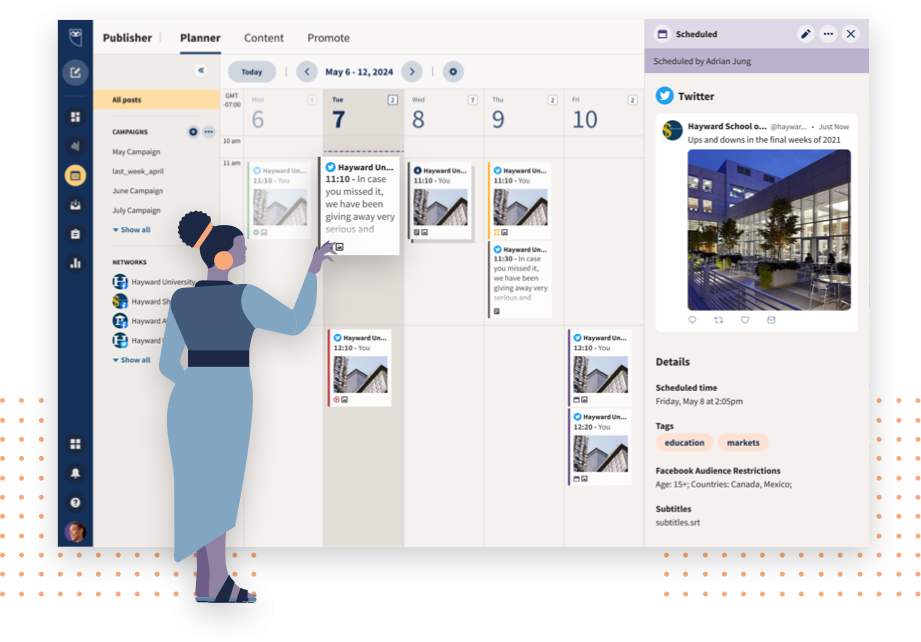
4. Email marketing automation
Mailchimp and Drip are great tools for creating and sending automated and customized email workflows, that way you’re always sending the right content to the right people at the right time. Seventh Sense is an AI-based platform that uses behavioral profiling to figure out the best send time and email frequency for each contact based on when they’re opening emails. The system works by building a predictive model for each contact based on their activity across various sources via HubSpot.
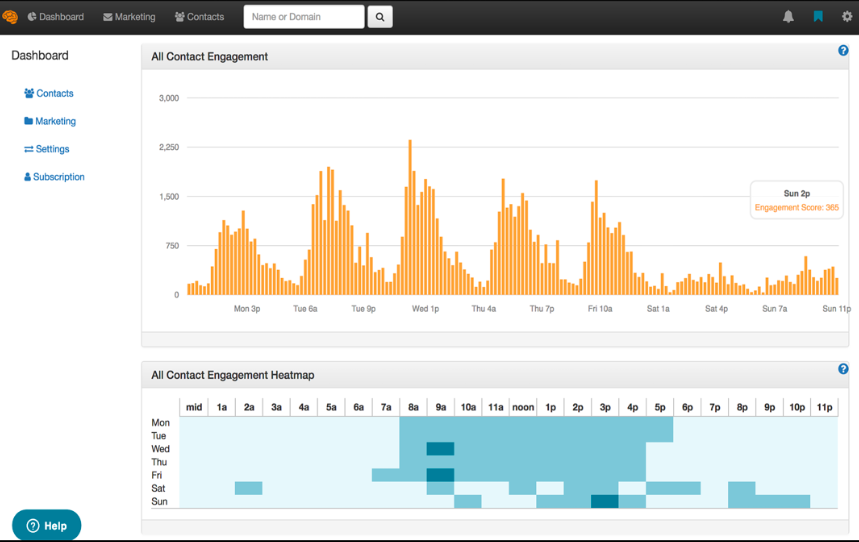
5. Appointment scheduling software
Scheduling software like Calendly makes it easy to book an appointment with your leads right on the spot of conversion, that way you’re not going back and forth with your leads trying to find a time to connect. And it integrates with your email calendar so you’re never double booked.
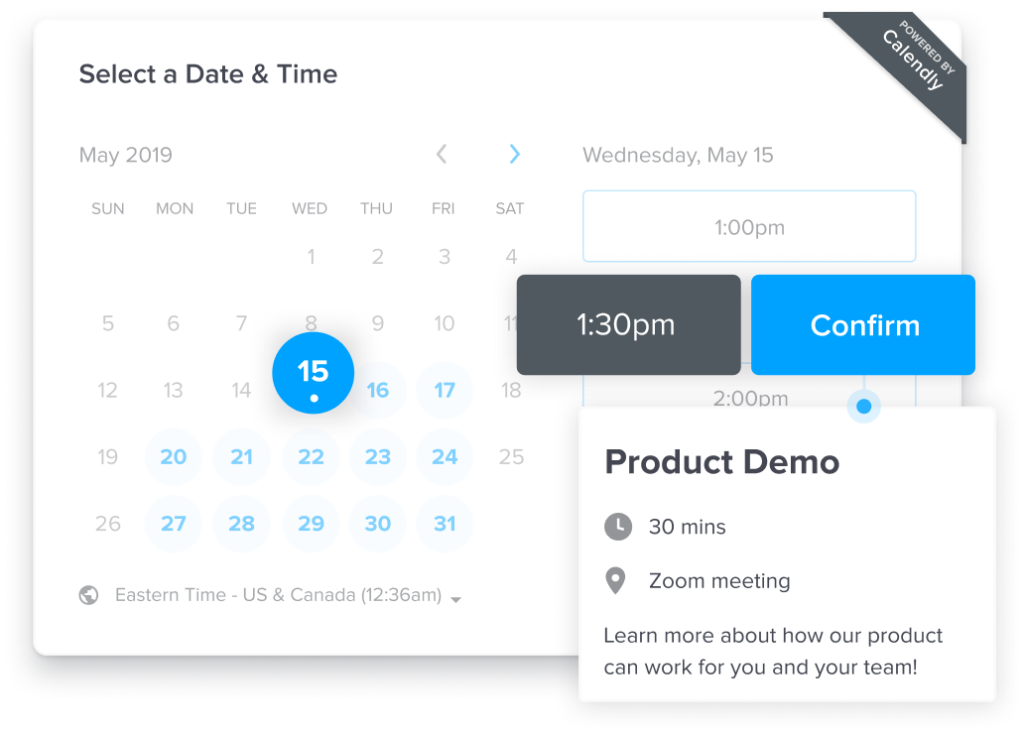
6. eSignature software
As COVID-19 has kept everyone at home, the ability to sign a document in person has become a challenge. With DocuSign you can provide an eSignature for items such as closing deals, signing up for new platforms, or adding new members to your team. This feature also contributes to potential time-sensitive deals that can not be signed in person due to distance.
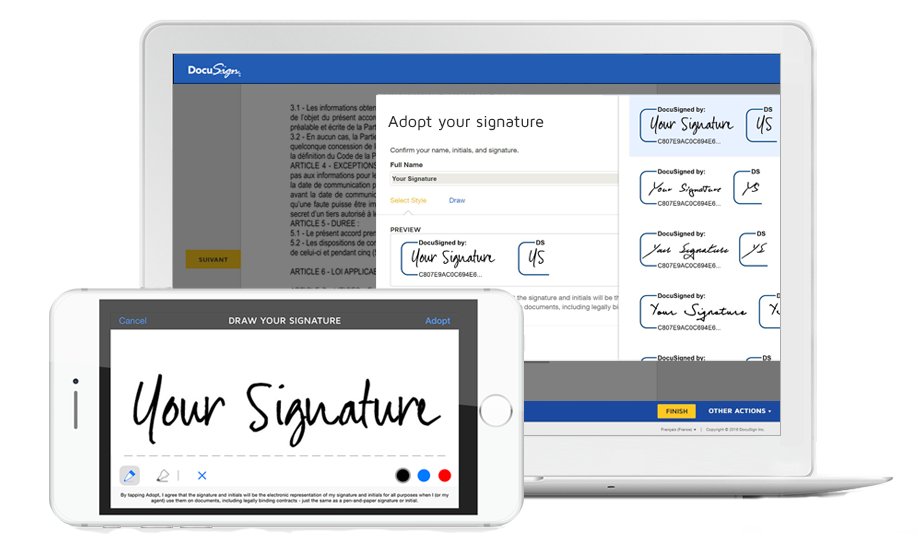
7. Online transaction tools
Programs such as Shopify and Square provide a secure online transactions making it quick and easy to close deals on the spot. Square allows every kind of payment to be used to make the product accessible to everyone at any time.
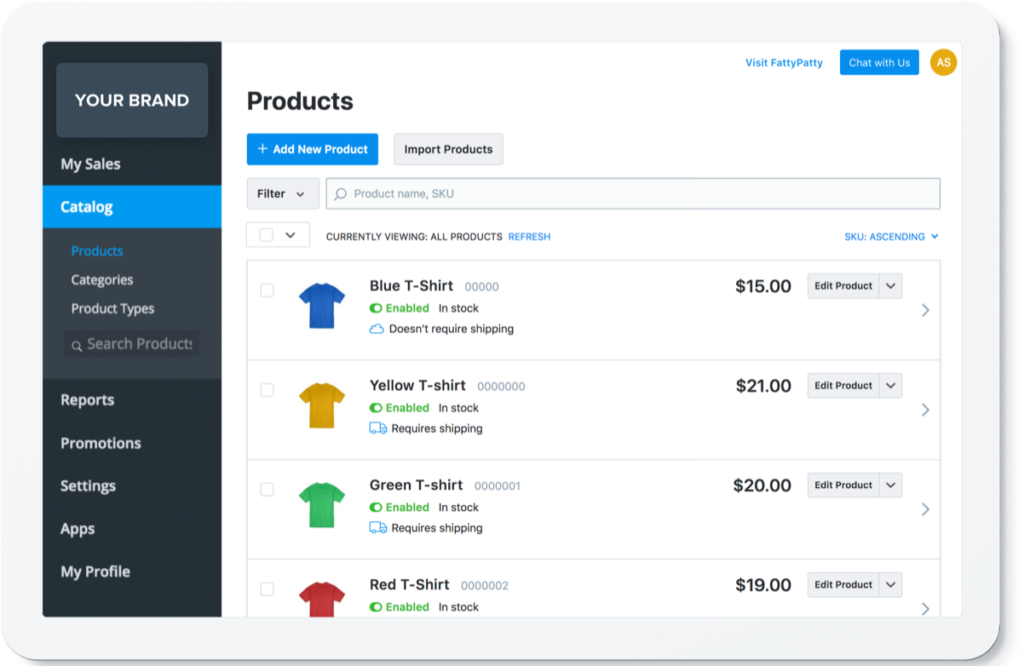
8. Interactive video software
Interactive video software like Minstamp makes it easy to maximize your viewer engagement with your leads by creating intelligent, dynamic, and personalized videos. Use questions in your videos to qualify leads and gather more information on your viewers’ interest. You can then sync that information within your CRM so you can continue to personalize your messages down the road. You can also use buttons and hotspots to nurture your leads through the sales funnel by providing additional resources and next steps throughout the video.
9. Smart content AI tools
Persado is a platform that uses AI and machine learning to produce language that resonates most with any given audience. This language can be applied to marketing materials like emails, whitepapers, and social media. This tool helps to personalize marketing messages to your audience so that they are more likely to engage with and respond to the message.
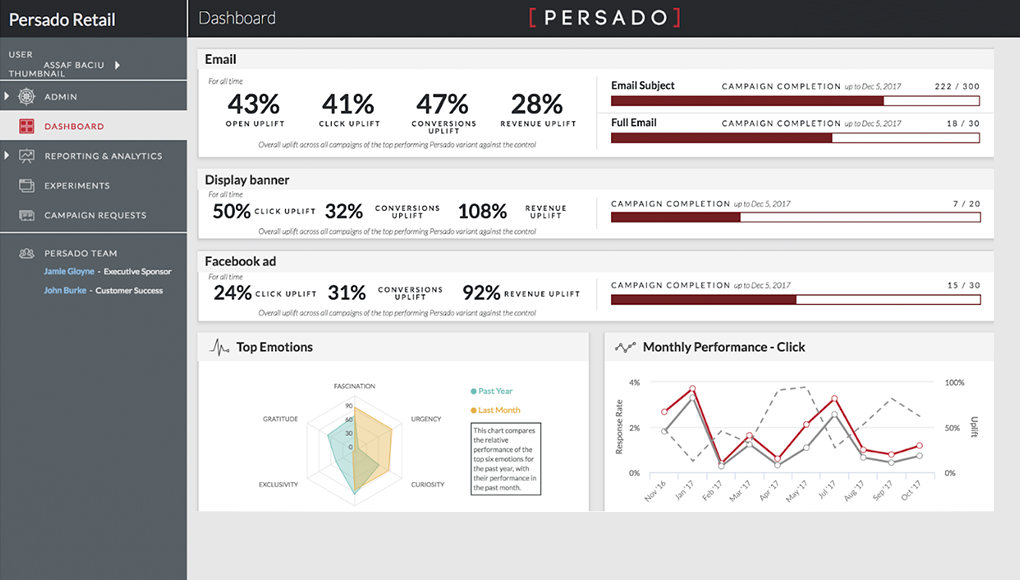
Albert AI is a self-learning software that automatically generates marketing campaigns for your brand. It analyzes vast amounts of data and uses it to run optimized campaigns autonomously. Albert lets you feed in on creative content and target markets and uses data from its own database to determine key characteristics of a serious buyer. Then, it identifies potential customers that match those traits, runs trial campaigns on a small group of customers, refines the campaign, and launches it on a larger scale.
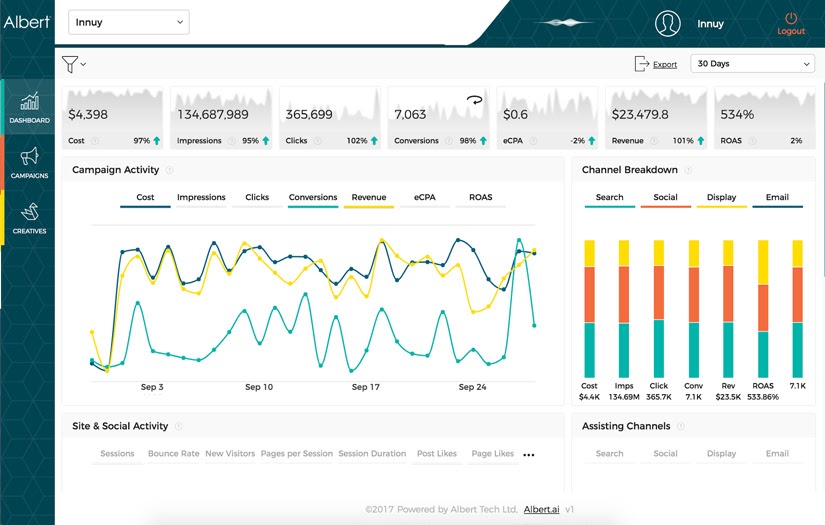
Rasa.io sends an individualized and completely custom “smart” newsletter to each one of your subscribers. Every time you send, you choose the sources and the topic and rasa.io handles the rest. AI collects and sifts through the articles your sources produce to pull only the most relevant topics for your newsletter; articles are then filtered and designated to be sent to each individual subscriber based on their own unique interests.
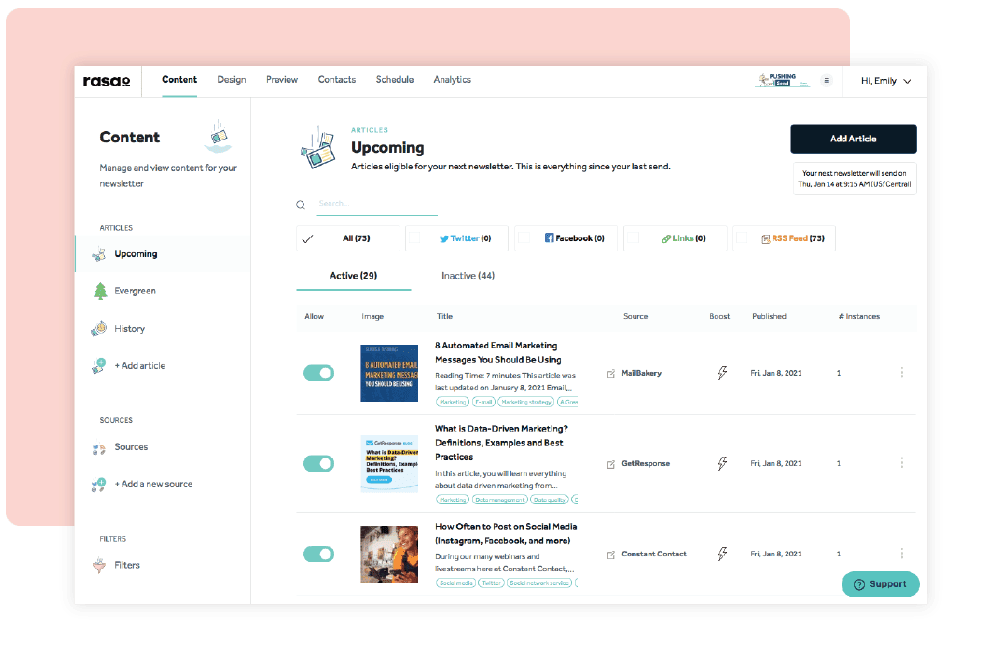
10. SEO and keyword research AI tools
MarketMuse helps companies create content strategies by identifying the best keywords to use on a topic of their choice. By doing so, MarketMuse saves marketers time by reducing time spent on SEO and competitive analysis. MarketMuse finds gaps and opportunities for new content and prioritizes them by their probable impact on your rankings. Not only will this expand content strategies, but makes the process easier!
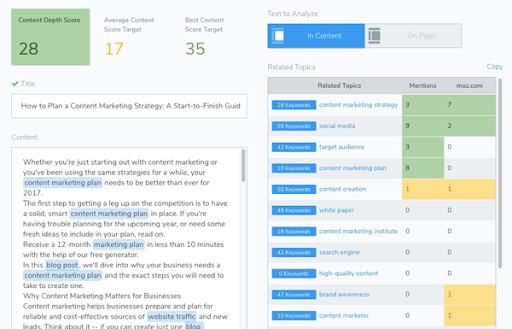
Partner with Pyxl
As you can see automation is an incredibly useful tool for businesses. To keep up with the fast past of today’s digital world, automation is no longer an option, but a necessity. With so many automation uses and tools it can be difficult to know where to begin or how to integrate within your current business processes. At Pyxl we’ll work with your business to figure out the best automation strategies and tools that fit your business needs now and in the future. Contact Pyxl today to see how we can help streamline your business with automation!
Updated: Apr 13, 2022
 Bonnie Winter
Bonnie Winter Kati Terzinski
Kati Terzinski